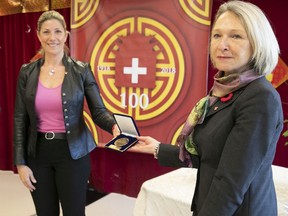风萧萧_Frank
以文会友
正文
Montreal Chinese Hospital honoured for pandemic response
https://montrealgazette.com/news/local-news/montreal-chinese-hospital-honoured-for-pandemic-response
Thanks to its staff's early efforts and commitment, the long-term care centre recorded only four COVID-19 infections and a single death.
Jesse Feith • Montreal Gazette Nov 08, 2021

Westmount–Saint-Louis MNA Jennifer Maccarone, left, hands over the National Assembly Medal of Honour to Sonia Bélanger, head of the CIUSSS du Centre-Sud l'Ile-de-Montréal on Monday November 8, 2021 at the Montreal Chinese Hospital. PHOTO BY PIERRE OBENDRAUF /Montreal Gazette
In January 2020, two months before Quebec announced its first pandemic lockdown, staff at the Montreal Chinese Hospital were already wearing masks and limiting visitors.
At the same time, many of the long-term care centre’s employees had also started living separately from their families. They didn’t want to infect their loved ones, but also didn’t want to risk bringing the virus into the centre.
In the end, the collective effort proved successful: over a year and a half, the centre recorded only four COVID-19 infections, no outbreaks, and a single death.
In a heartfelt ceremony Monday, employees and management were awarded the Medal of the National Assembly for their resilience and dedication during the crisis.
“It’s easy to get lost in all the negativity and heartbreaking stories, and we must never forget all those we’ve lost,” said Jennifer Maccarone, the Liberal MNA for Westmount — Saint-Louis, while presenting the honour to staff.
“But it’s also important to show gratitude toward the heroes who worked non-stop, without ever putting themselves first, to help those who were most vulnerable.”
Located near Chinatown, the centre operates under the CIUSSS Centre-Sud-de-l’Île-de-Montreal. On Monday, the health authority’s director, Sonia Bélanger, recalled how Montreal was the epicentre of the pandemic during the first wave in 2020.
And yet, she said, thanks to the centre’s efforts and quick thinking, it still managed to keep the virus at bay as it was devastating other homes across the network.
Bélanger said that in retrospect there were lessons to learn from how the centre reacted before others, but noted how hectic the early days of the pandemic were.
“It hit us fast and took us by surprise,” she said. “We had prepared and made sure our hospitals were ready , but unfortunately, COVID-19 entered through CHSLDs instead.”
And though the city’s long-term care centres are in much better shape today — thanks in large part to high vaccination rates — Bélanger said it’s still important to pause and recognize those that made a difference at the peak of the crisis.
“I think we can learn a lot from what happened here,” she said.
In an interview, Sandra Lavoie, the centre’s coordinator, said she believes several factors contributed to its success, including that it’s housed in a well-maintained building and didn’t experience the same staff shortages as others.
But she gives the bulk of the credit to how seriously staff took the virus from the very start, implementing measures when COVID-19 was barely being discussed in Quebec. About 70 per cent of the centre’s staff are of Chinese descent, and many have friends and family who warned them of what was happening in China.
Employees began bringing in their own masks and protective equipment, Lavoie said, and made sure to explain why the measures were necessary to the centre’s 128 residents and their families.
In contrast, an ongoing public coroner’s inquest has heard how employees at other long-term care centres were told not to wear masks early on to avoid causing a panic.
Monday’s ceremony was marked by a moment of silence to remember all those who died in CHSLDs during the pandemic.
Residents, employees and management also raised a toast, with apple juice, to acknowledge their efforts.
Addressing those on hand, Ponora Ang, president of the Montreal Chinese Hospital Foundation, said to this day people still ask him how the centre managed to fare so well.
“It can seem like a magic trick, but it wasn’t magic,” Ang said. “It was good decisions taken at the right moment, with good management and exemplary employees.”
[email protected]
评论
目前还没有任何评论
登录后才可评论.




